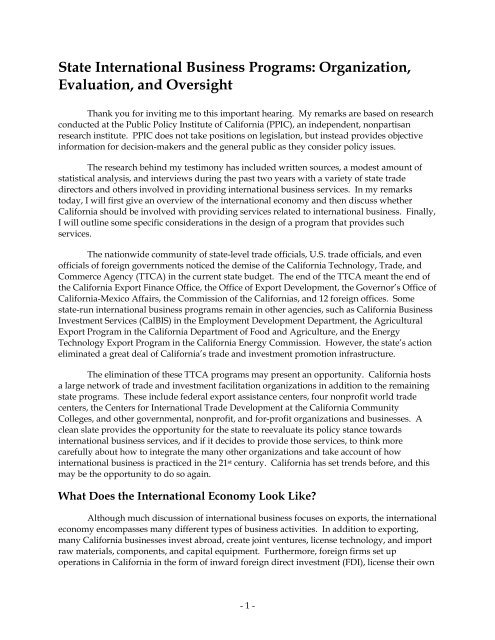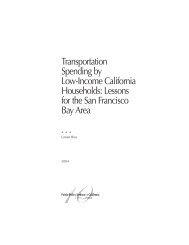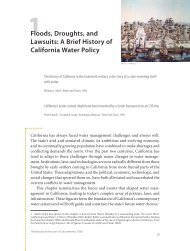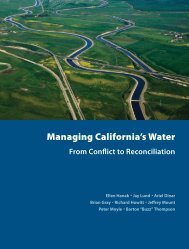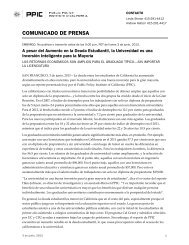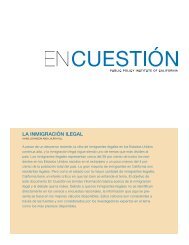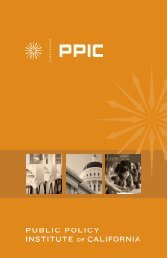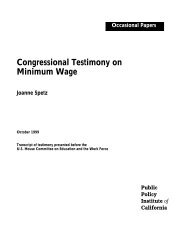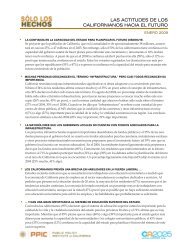Occasional Paper Title - Public Policy Institute of California
Occasional Paper Title - Public Policy Institute of California
Occasional Paper Title - Public Policy Institute of California
Create successful ePaper yourself
Turn your PDF publications into a flip-book with our unique Google optimized e-Paper software.
State International Business Programs: Organization,<br />
Evaluation, and Oversight<br />
Thank you for inviting me to this important hearing. My remarks are based on research<br />
conducted at the <strong>Public</strong> <strong>Policy</strong> <strong>Institute</strong> <strong>of</strong> <strong>California</strong> (PPIC), an independent, nonpartisan<br />
research institute. PPIC does not take positions on legislation, but instead provides objective<br />
information for decision-makers and the general public as they consider policy issues.<br />
The research behind my testimony has included written sources, a modest amount <strong>of</strong><br />
statistical analysis, and interviews during the past two years with a variety <strong>of</strong> state trade<br />
directors and others involved in providing international business services. In my remarks<br />
today, I will first give an overview <strong>of</strong> the international economy and then discuss whether<br />
<strong>California</strong> should be involved with providing services related to international business. Finally,<br />
I will outline some specific considerations in the design <strong>of</strong> a program that provides such<br />
services.<br />
The nationwide community <strong>of</strong> state-level trade <strong>of</strong>ficials, U.S. trade <strong>of</strong>ficials, and even<br />
<strong>of</strong>ficials <strong>of</strong> foreign governments noticed the demise <strong>of</strong> the <strong>California</strong> Technology, Trade, and<br />
Commerce Agency (TTCA) in the current state budget. The end <strong>of</strong> the TTCA meant the end <strong>of</strong><br />
the <strong>California</strong> Export Finance Office, the Office <strong>of</strong> Export Development, the Governor’s Office <strong>of</strong><br />
<strong>California</strong>-Mexico Affairs, the Commission <strong>of</strong> the <strong>California</strong>s, and 12 foreign <strong>of</strong>fices. Some<br />
state-run international business programs remain in other agencies, such as <strong>California</strong> Business<br />
Investment Services (CalBIS) in the Employment Development Department, the Agricultural<br />
Export Program in the <strong>California</strong> Department <strong>of</strong> Food and Agriculture, and the Energy<br />
Technology Export Program in the <strong>California</strong> Energy Commission. However, the state’s action<br />
eliminated a great deal <strong>of</strong> <strong>California</strong>’s trade and investment promotion infrastructure.<br />
The elimination <strong>of</strong> these TTCA programs may present an opportunity. <strong>California</strong> hosts<br />
a large network <strong>of</strong> trade and investment facilitation organizations in addition to the remaining<br />
state programs. These include federal export assistance centers, four nonpr<strong>of</strong>it world trade<br />
centers, the Centers for International Trade Development at the <strong>California</strong> Community<br />
Colleges, and other governmental, nonpr<strong>of</strong>it, and for-pr<strong>of</strong>it organizations and businesses. A<br />
clean slate provides the opportunity for the state to reevaluate its policy stance towards<br />
international business services, and if it decides to provide those services, to think more<br />
carefully about how to integrate the many other organizations and take account <strong>of</strong> how<br />
international business is practiced in the 21 st century. <strong>California</strong> has set trends before, and this<br />
may be the opportunity to do so again.<br />
What Does the International Economy Look Like?<br />
Although much discussion <strong>of</strong> international business focuses on exports, the international<br />
economy encompasses many different types <strong>of</strong> business activities. In addition to exporting,<br />
many <strong>California</strong> businesses invest abroad, create joint ventures, license technology, and import<br />
raw materials, components, and capital equipment. Furthermore, foreign firms set up<br />
operations in <strong>California</strong> in the form <strong>of</strong> inward foreign direct investment (FDI), license their own<br />
- 1 -


